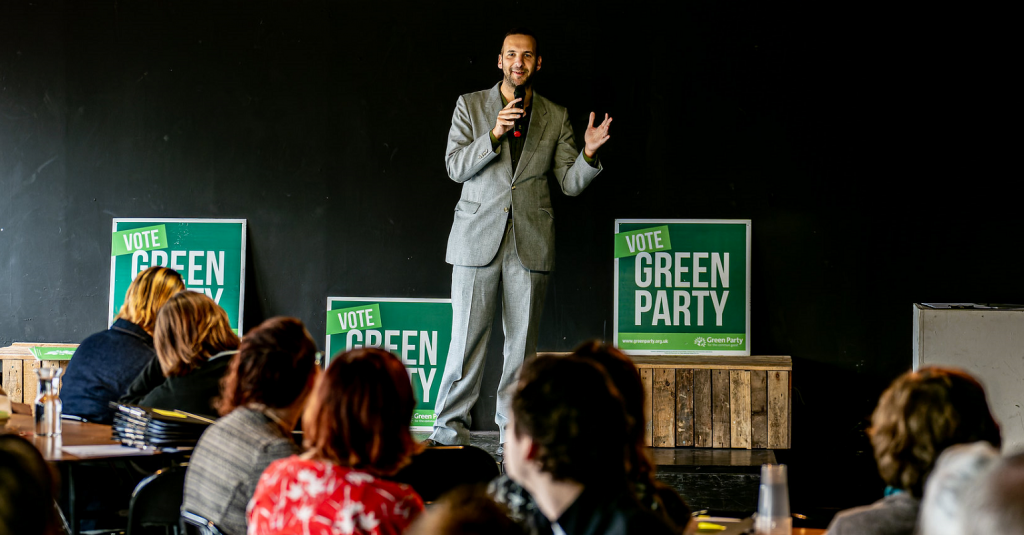A Green hierarchy of needs—time to prioritise?

So many newspaper stories about the Greens, but it’s always the zany ones people remember: ban cars, ban the Grand National, ban Beyonce.
These were the favourites that were cited to me by people during the election campaign. Of course they’re a distortion of actual policy, presented by a media we wish to break up. Yet there is no doubt they are a distraction from core Green policy and even confuse members. For example, at the Spring Conference, a motion shot up the Green prioritization ballot to: ‘End Green policy to ban cars’ – however, that policy that never existed.
The problem we have is that other parties get a daily drip feed and discussion of their own policies in the media, whilst Green policies don’t. In part, it’s because our strength (deviation from the status quo and a wider lens) is also our weakness. The context of Green policies takes time to explain and time equals effort for stretched journalists. Kate Raworth’s zero growth doughnut economics could use up a word count in itself on the mere fundamentals of what we believe in. This means that when our policy is reported it is often at the most simplistic level and released as a buzzword bomb. The reverberations of these media distortions cause damage and often remain in place until your local friendly green activist provides an opportunity to set the facts right.
Unfortunately, mythbusting takes time and being volunteers, our activists have very of it on their hands due to other commitments. I calculated that, whenever out canvassing, I was spending half an hour on each doorstep, of which 20 minutes was mythbusting and objection handling before I could get to 10 minutes on manifesto pledges. Even with 8 hours at my disposal, that would only be 16 people I could speak to per day. Somewhere, something has to give. To progress we need to prioritise.
An area where it might be beneficial to have some give would be to call a moratorium on the sport of party policy-making on every little issue that our members feel strongly about. I sometimes wonder if there has been a calculation done as to how many years in parliament we would need to vote in and implement each and every legislative nuance proposed in our conferences. It may be more effective for the party to take its overarching aims and principles, place them in concrete terms and bestow upon people the tools they need to elicit change external to government process.
An example of this in action is the Human Rights Act 1998 (HRA). For a number of years the HRA has been on the end of some dodgy counter-marketing and has been sold by the media as a ‘charter for criminals and terrorists’. Although people associated with these pejorative labels have certainly benefited, originally the Act wouldn’t have attained the support it needed to pass if that had been the discussion that accompanied it in the media at the time. Instead, people have focused on the bigger picture when it came to human rights.
As we know the ingenuity of humankind knows no bounds when it comes to ways and means to destroy the environment or mistreat animals. Then why do we need to identify and enshrine into our policies the specifics of environmental degradation or animal mistreatment, when we could ask for an Ecology Rights Act or Animal Right Act. Like the HRA, this would give people or pressure groups the tools to make change as situations occur. Whilst our policy on drugs does not call for criminalization, a relevant parallel can be seen with the Government’s misguided approach to legal highs. Each time they ban a specific substance, the synthetic structure of the compound is altered to get around the ban, and the ban becomes meaningless.
It’s been said that change doesn’t happen like lightning, instead it occurs incrementally like fog.
However, as a party the worry is we could forever be reactively chasing rainbows as opposed to setting the conditions for change we wish to see.
Scott Bartle is a member of Brent Green Party and this year stood as a parliamentary candidate in the constituency of Brent North. You can find him on twitter @mapesburygreen.




In one sense it’s good that the Green Party has had chance to hone many of its policies. On the other hand, it’s all too easy for one of Andrew Neal’s researchers to mine something long-forgotten.
It is good that the party has got things well worked out, but it really oughtn’t to be open to sabotage with something like copyright policy, and completely unfair when other parties are allowed to electioneer on one, or at most a few issues. So I agree with the sentiment here: review, then ditch the bad stuff, corral the minutiae, and have half a dozen policy areas that can work as a broad theme, but can be broken down when required.
P.S. Kate Raworth’s doughnut – marvelous! 😉
I agree in broad terms with Scott’s article and your comment, but the great difficulty is in determining what constitutes a minor issue, and the process by which that decision is made.
For example, the party’s position on copyright and digital rights has long helped us counter a loss of votes to the likes of the Liberal Democrats and the Pirate Party in European elections. Our MEPs have a very strong track record on these issues. They may not be ‘doorstep issues’, and as we saw in the General Election they can surprise and anger people who are unfamiliar with them, but they can be said to have a place in our policy documents.
Should some elected committee be able to block or prioritise motions, as happens for example with the Liberal Democrats?
One thing is for sure, our whole policy process is in need of an overhaul. That’s all the more obvious now we have so many members, as it has become completely unwieldy.
I guess I’m still reeling from the savagery of the attack from the media during the General Election campaign – it seemed to be far harsher than towards the other parties, but perhaps I’m biased or just thin-skinned.
I realise that, unlike other parties, the Greens work in concert with a world-wide network of others, and that that should make policy even stronger. And, in a sense, party policy ought to be more about what’s right, than what’s a vote-winner.
One of the strongest cards the Green Party has is its commitment to democracy in allowing all its members to suggest policy. I wouldn’t want to see anything watering that down. I also recognize that policy making is a continual process of refining ideas. But there does need to be some mechanism, perhaps as suggested, of containment, so that the evolution is obvious. Another perceived weakness that was unfairly exploited was the difference between manifesto commitment and long-term aims…